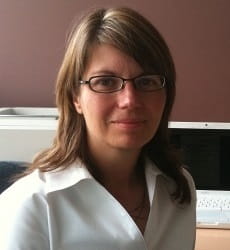
11/11/2020
PITTSBURGH – Researchers from the Pittsburgh Center for Pain Research at the University of Pittsburgh School of Medicine announced today in the journal Neuron that they’ve uncovered additional complexities behind mechanical allodynia—the sensation of pain from innocuous stimuli, such as light touch.
Different types of injury that cause mechanical allodynia activate distinct spinal circuits that process the information from the skin to the brain, scientists discovered. The finding may explain why pain medications don’t alleviate an adverse sensation in all patients. It also suggests that new treatment strategies for pain management need to consider ways in which pain signals are processed in the spinal cord.
 “Even though the pain outcome is the same, the neural circuits that conduct the signal are different depending on the kind of injury you have—say, arthritis or nerve trauma,” said senior author Rebecca Seal, Ph.D., associate professor in Pitt’s Department of Neurobiology. “And if you have different neural pathways depending on the type of injury, that might explain why therapies sometimes don’t work.”
“Even though the pain outcome is the same, the neural circuits that conduct the signal are different depending on the kind of injury you have—say, arthritis or nerve trauma,” said senior author Rebecca Seal, Ph.D., associate professor in Pitt’s Department of Neurobiology. “And if you have different neural pathways depending on the type of injury, that might explain why therapies sometimes don’t work.”
For patients who experience mechanical allodynia, even the most mundane actions can hurt: Putting on clothes or even tossing in bed can be excruciatingly painful. The condition currently has no cure.
While recent studies identified the critical role of skin receptors for the perception of pain after a light touch, little was known about the way information is transferred from the nerve endings in the skin to the central nervous system where the pain sensation forms.
“People typically think of mechanical allodynia as a condition that is uniform in terms of its underlying neural circuitry in the central nervous system,” said Seal. “We now show that is not the case.”
Pitt researchers used several pain models to determine if calretinin-expressing (CR) neurons located in the outermost layer of the dorsal horn—one of the three gray columns of the spinal cord—are important to convey mechanical allodynia.
Experiments in mice showed that these neurons are critical for transmitting pain signals induced by inflammatory injuries but not by nerve injury.
Conversely, another subset of neurons of the spinal cord—this time PKC-gamma neurons, which lay adjacent to CR neurons at the border between the second and third layer of the dorsal horn—were responsible for animals feeling neuropathic-induced pain but not pain of inflammatory origin.
Lastly, researchers found that Cholecystokinin (CCK) neurons located deeper within the layers of the dorsal horn are important for both types of injuries.
“Now that we know more about how spinal circuitry of pain is organized, we can use gene therapy to shut it off,” said Seal. Her lab currently is working on developing ways to target neurons in the spinal cord using viral gene therapy and chemogenetics in patients experiencing mechanical allodynia.
“A lot of work has been done to understand how sensory neurons transmit pain signals, but we didn’t know much about what happens in the spinal cord,” she added. “Cracking that black box open in this unique way feels particularly exciting.”
Additional authors on this research include Cedric Peirs, Ph.D., Sean-Paul G. Williams, Xinyi Zhao, M.D., Cynthia M. Arokiaraj, David W. Ferreira, Ph.D., Myung-chul Noh, Ph.D., Kelly M. Smith, Ph.D., Priyabrata Halder, Ph.D., Kelly A. Corrigan, Jeremy Y. Gedeon, Suh Jin Lee, David Chi, M.D., and Sarah Ross, Ph.D., all of Pitt; and Graziana Gatto, Ph.D., and Martyn Goulding, Ph.D., of the Salk Institute for Biological Sciences, California.
This research was funded by the Rita Allen Foundation, American Pain Association, American Diabetes Association, National Institutes of Health grants NS104964, NS096705 and AR063772, NS111643, NS073548, NS111791, David Scaife Family Charitable Foundation Fellowships, and the China Scholarship Council Foundation.
PHOTO INFO:
CREDIT: Rebecca Seal
CAPTION: Rebecca Seal, Ph.D.
















